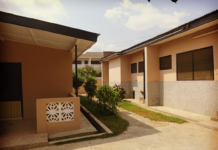
The Rent Control Department received a total of 73, 352 cases from landlords and tenants in the last four years.
According to the department, the highest number was recorded in 2021 with 20,221 cases followed by 20,080 cases last year, while 18,069 cases in were recorded 2019 and 14, 982 of the landlord-tenant cases were received in 2020.
Giving the breakdown, the Public Relations Officer (PRO) of the Rent Control Department, Emmanuel Hovey Kporsu, said 60,622 cases out of the 73, 352 were settled, while 5,038 cases were pending and 1,662 cases withdrawn.
He revealed that 4, 452 of the cases had been struck out and 1,578 of such cases referred to the law courts.
Mr Kporsu who was speaking to the Ghanaian Times in an exclusive interview in Accra last Thursday to highlight rent issues in the country said the recent economic downturn had affected landlords and tenants’ relationships as a lot of tenants were finding it difficult to meet their payment schedule, thereby leading to litigation.
Non-payment of rent, he said accounted for 73 percent with the remaining 27 percent being tenants taking on landlords for forceful eviction, unreasonable rent increases, and delay or refusal to refund tenant’s balance of rent advance if the premises was later discovered not to meet their expectation.
To help reduce rent cases, Mr Kporsu said early this year, the government launched the National Rent Assistance Scheme (NRAS) to provide rent loans to both formal and informal sector workers with regular income.
He explained that eligible persons must be Ghanaian, possess a valid Ghana Card, be 18 years and above, have verifiable employment and earned income, verifiable bank statement or mobile money statement, and rent payable must not exceed 30 percent of the household income.
So far, 860 people across the country have benefited from the scheme.
Greater Accra accounted for 536 beneficiaries representing 63.3 percent, 151, representing 17.6 percent for the Ashanti Region, Bono East with 87, representing 10.1 percent, Western Region with 67 representing 7.8 percent, 11 in Eastern representing 1.3 percent and eight people in the Northern Region representing 0.9 per cent.
This, he advised citizens who have intention to rent and do not have the means to rent the maximum rent advance, to register with NRAS to go through the eligible procedures to secure the house.
Mr. Kporsu noted that it was illegal for landlords to increase rent rates without the prior assessment and approval of the Rent Control Department, as all new rent rates must be approved by them to make sure it suited both parties.
“Under Section 19, (1) it says no landlord of premises shall collect from the tenant of such premises any increase of rate attributable to any increase of rate in respect of such premises unless he has notified the tenant previously in writing in a prescribed form, the amount of the old rate, the amount of the new rate and where part of any premises has been let, the amount of rate attributed to such part, the amount of the increase in rent and that from which the new rate takes effect,” he noted.
ALSO READ:





